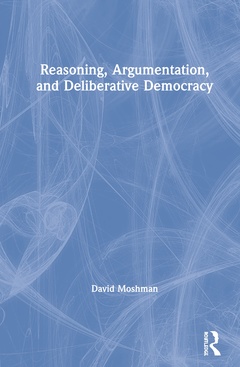Reasoning, Argumentation, and Deliberative Democracy
Auteur : Moshman David

In light of the latest research from cognitive and developmental psychology, this key text explores reasoning, rationality, and democracy, considering the unique nature of each and their relationship to each other.
Broadening our understanding from the development of reasoning and rationality in individuals to encompass social considerations of argumentation and democracy, the book connects psychological literature to philosophy, law, political science, and educational policy. Based on psychological research, Moshman sets out a system of deliberative democracy that promotes collaborative reasoning, rational institutions such as science and law, education aimed at the promotion of rationality, and intellectual freedom for all. Also including the biological bases of logic, metacognition, and collaborative reasoning, Moshman argues that, despite systematic flaws in human reasoning, there are reasons for a cautiously optimistic assessment of the potential for human rationality and the prospects for democracy.
Reasoning, Argumentation, and Deliberative Democracy will be essential reading for all researchers of thinking and reasoning from psychology, philosophy, and education.
1. Introduction
Overview
Reasoning and Rationality
Cognition and Development
Argumentation and Democracy
Conclusion
2. Development of Logical Reasoning
Early Logic
Progress in Logical Reasoning
Logical Reasoning in Adulthood
Mathematical Reasoning
Conclusion
3. Reasoning Beyond Logic
Scientific Reasoning
Moral Reasoning
Social Conventional Reasoning
Reasoning as Epistemologically Self-Regulated Thinking
Conclusion
4. Metacognition and Epistemic Cognition
Metacognition
Epistemic Development in Childhood
Epistemic Development Beyond Childhood
Complexities of Epistemic Cognition
Conclusion
5. Argumentation as Collaborative Reasoning
Collaborative Reasoning in a Logic Task
Additional Evidence for Collective Rationality
The Rational Social Ideal
Conclusion
6. Democracy as Collaborative Rationality
Deliberative Democracy
Is Democracy Psychologically Possible?
Rationality and Identity
Rational Institutions
Intellectual Freedom in Society
Conclusion
7. The Rational Construction of Rational Agency
"The Enigma of Reason"
Constructivist Accounts of Development
Development Across and Beyond Childhood
Development of Rational Self-Governance
Conclusion
8. Education for Rationality
Critical Thinking
Education as the Promotion of Development
Indoctrination in Curriculum and Instruction
Intellectual Freedom in Education
The Rational Ideal
Conclusion
9. Reasons and Persons
Becoming the Borg
"The Robot’s Rebellion"
Who Counts as a Person?
What Counts as a Reason?
Conclusion
Glossary
References
Author Index
Subject Index
Date de parution : 10-2020
15.2x22.9 cm
Date de parution : 10-2020
15.2x22.9 cm
Thèmes de Reasoning, Argumentation, and Deliberative Democracy :
Mots-clés :
Epistemic Cognition; Metalogical Understanding; Thinking; Collaborative Reasoning; Reasoning; Deliberative Democracy; Rationality; Rational Agency; Problem-Solving; Intellectual Freedom; Cognitive Development; Dual Process Theories; Logic; Social Systems; Metacognition; Epistemic Development; Face To Face; Argumentation; Logical Reasoning; Societal Rationality; Star Trek Universe; Educational policy; Inferential Validity; Rational argumentation; Star Trek; Substantial Individual Differences; Cognitive and developmental psychology; Social Conventional Reasoning; Direct Democracy; Standing Bear; Ideal Rational Agent; Transitive Inference; Mental Logic Theories; Tertiary Circular Reactions; Direct Reasoning Routine; Selection Task; Hypothetico Deductive Reasoning



